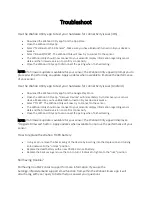
38
E
Troubleshooting
If you are experiencing any problem with your display, before
calling for service, please review the following troubleshooting
tips.
There is no picture or sound.
• Is the power cord disconnected? (See page 14.)
• Is the main power switch off? (See page 17.)
• Is the monitor in standby mode (the power LED illuminating
in orange)? (See page 17.)
• Make sure correct input mode is selected. (See page 18.)
• If any external equipment is connected, make sure the
equipment is operating (playing back).
Remote control does not work.
• Are the batteries inserted with polarity (+,-) aligned? (See
page 16.)
• Are the batteries exhausted?
• Point the remote control unit toward the monitor’s remote
control sensor. (See page 16.)
• Is ON SCREEN DISPLAY set to OFF or is operation
disabled? (See page 30.)
Sound is heard from only one side.
• Are audio cables connected properly?
• Check the setting of BALANCE for AUDIO menu. (See
page 26.)
There is a picture but no sound.
• Is the sound muted?
• Make sure the volume is not set to minimum.
• Are audio cables connected properly?
• Is the setting of INPUT SELECT on the SETUP menu
correct? (See page 27.)
Unstable video.
• The signal may be incompatible. (See page 41.)
• Try the automatic screen adjustment when the D-SUB are
used. (See page 29.)
The video from the HDMI input terminal does not appear
properly.
• Is the setting for HDMI SETTING of INPUT SELECT on the
SETUP menu correct? (See page 27.)
• Is the HDMI cable HDMI standard compliant? The monitor
will not work with cables that are not standard compliant.
• Is the input signal compatible with this monitor? (See page
41.)
• To show 4K2K video or 1080p video, use a high-speed
HDMI cable.
• If connected to a HDMI1 - 3 input terminal while inputting
4:2:0 format, connect to the HDMI4 input terminal. The
video and audio of some connected devices may not output
correctly because the HDMI1 - 3 input terminals support
3840 x 2160 (60Hz) 4:4:4 or 4:2:2 format. (See page 12.)
The video from PC D-Sub input terminal does not appear
correctly.
• Is the setting for SCREEN POSITION of INPUT SELECT
on the SETUP menu correct? (See page 27.)
• Is the input signal compatible with this monitor? (See page
41.)
Control buttons do not work.
There is no picture.
• Load noises from outside may be interfering with normal
operation. Turn off the power and turn it on after waiting at
least 5 seconds, and then check the operation.
Power LED flashes red.
• Hardware has a problem. Turn off the monitor and request
repair from your SHARP dealer.
The monitor makes a cracking sound.
• You may occasionally hear a cracking sound from the
monitor. This happens when the cabinet slightly expands
and contracts according to change in temperature. This
does not affect the monitor’s performance.
The Power LED is flashing in red and green alternately.
• When the internal temperature of the monitor rises
excessively, the brightness of the backlight decreases
automatically in order to prevent high-temperature-related
problems. If the internal temperature rises further, the
monitor automatically enters standby mode and the Power
LED blinks red and green alternately.
• Remove the cause of the excessive temperature rise.
- If the monitor enters standby mode due to a rise in
temperature, to return to normal display, turn the power
switch off and then back on again. The monitor, however,
will enter standby mode again if the cause of the
temperature rise is not eliminated. (See page 8.)
- Check whether the monitor is placed at a location where
a quick rise in temperature is likely. Internal temperature
rises quickly if the vents on the monitor are blocked.
- Internal temperature rises quickly if dust accumulates
inside the monitor or around the vents. Remove dust if
possible. Ask SHARP dealer about removing internal dust.
Summary of Contents for PN-H801
Page 1: ...PN H801 LCD MONITOR OPERATION MANUAL ...
Page 53: ...PN H801 Mu EN15M 1 ...
















































